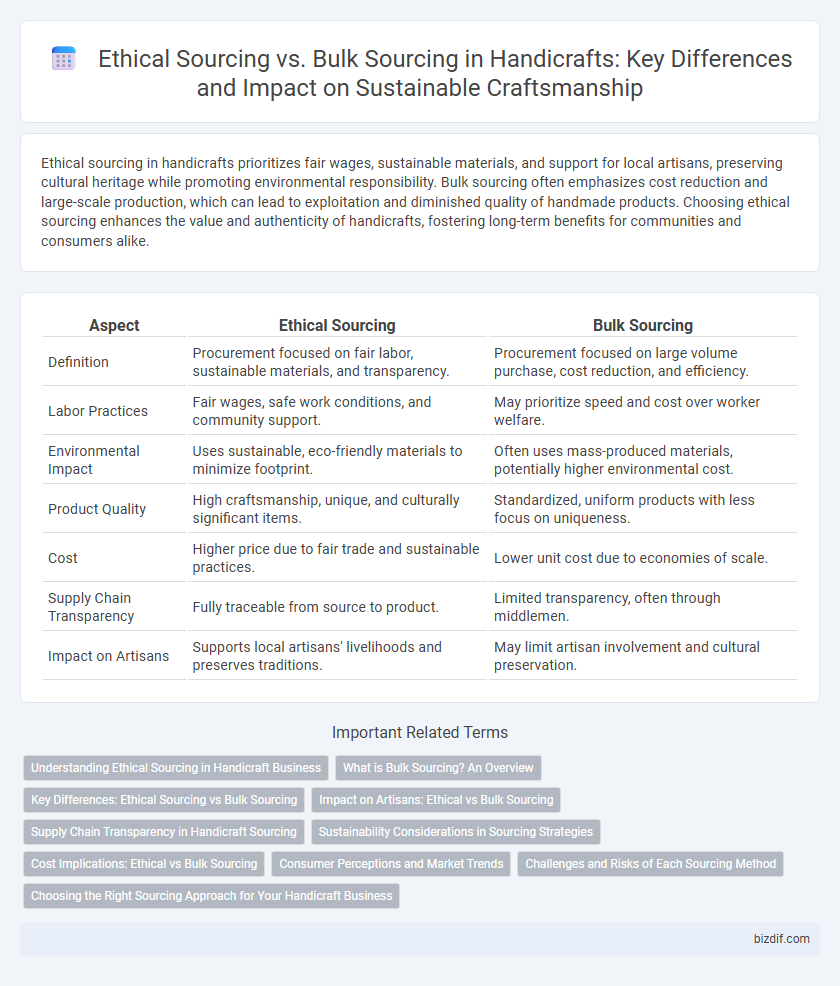Ethical sourcing in handicrafts prioritizes fair wages, sustainable materials, and support for local artisans, preserving cultural heritage while promoting environmental responsibility. Bulk sourcing often emphasizes cost reduction and large-scale production, which can lead to exploitation and diminished quality of handmade products. Choosing ethical sourcing enhances the value and authenticity of handicrafts, fostering long-term benefits for communities and consumers alike.
Table of Comparison
| Aspect | Ethical Sourcing | Bulk Sourcing |
|---|---|---|
| Definition | Procurement focused on fair labor, sustainable materials, and transparency. | Procurement focused on large volume purchase, cost reduction, and efficiency. |
| Labor Practices | Fair wages, safe work conditions, and community support. | May prioritize speed and cost over worker welfare. |
| Environmental Impact | Uses sustainable, eco-friendly materials to minimize footprint. | Often uses mass-produced materials, potentially higher environmental cost. |
| Product Quality | High craftsmanship, unique, and culturally significant items. | Standardized, uniform products with less focus on uniqueness. |
| Cost | Higher price due to fair trade and sustainable practices. | Lower unit cost due to economies of scale. |
| Supply Chain Transparency | Fully traceable from source to product. | Limited transparency, often through middlemen. |
| Impact on Artisans | Supports local artisans' livelihoods and preserves traditions. | May limit artisan involvement and cultural preservation. |
Understanding Ethical Sourcing in Handicraft Business
Ethical sourcing in the handicraft business ensures materials and labor are obtained responsibly, prioritizing fair wages, sustainable practices, and the preservation of traditional crafts. It supports artisans by valuing their skills and cultural heritage while minimizing environmental impact through eco-friendly raw materials. Businesses that embrace ethical sourcing foster transparency and long-term relationships with local communities, contrasting with bulk sourcing, which often prioritizes cost over social and environmental responsibility.
What is Bulk Sourcing? An Overview
Bulk sourcing involves purchasing large quantities of materials or products directly from manufacturers or suppliers, often prioritizing cost-efficiency and volume discounts. This method is common in industries prioritizing scale and uniformity but may overlook the social and environmental implications associated with supply chains. Unlike ethical sourcing, bulk sourcing generally does not emphasize fair labor practices, environmental sustainability, or community impact in its procurement strategies.
Key Differences: Ethical Sourcing vs Bulk Sourcing
Ethical sourcing prioritizes fair labor practices, environmental sustainability, and the welfare of artisans, ensuring transparency and social responsibility throughout the supply chain. Bulk sourcing focuses on cost efficiency and large volume procurement, often neglecting the socio-environmental impact of production. The key difference lies in ethical sourcing's commitment to positive social outcomes versus bulk sourcing's emphasis on minimizing expenses and maximizing quantity.
Impact on Artisans: Ethical vs Bulk Sourcing
Ethical sourcing prioritizes fair wages, safe working conditions, and empowerment of artisans, fostering sustainable livelihoods and preserving traditional craftsmanship. Bulk sourcing often prioritizes cost-efficiency over artisan welfare, leading to exploitation, diminished artisan skills, and loss of cultural heritage. Supporting ethical sourcing ensures artisans maintain creative control and benefit economically, promoting social equity and cultural preservation in the handicraft sector.
Supply Chain Transparency in Handicraft Sourcing
Supply chain transparency in handicraft sourcing ensures ethical practices by tracing materials from origin to final product, contrasting with bulk sourcing which often obscures the provenance of goods. Ethical sourcing emphasizes fair wages, sustainable materials, and artisan empowerment, fostering trust and authenticity in the handicraft market. Transparent supply chains enhance consumer confidence and support sustainable development within artisan communities.
Sustainability Considerations in Sourcing Strategies
Ethical sourcing in handicraft prioritizes sustainability by ensuring materials are obtained through fair labor practices, minimal environmental impact, and support for local artisans' livelihoods. Bulk sourcing often emphasizes cost-efficiency and scale but can lead to resource depletion, increased carbon footprint, and exploitation risks. Sustainable sourcing strategies balance ecological preservation with social responsibility, promoting long-term viability of materials like organic fibers, natural dyes, and recycled components.
Cost Implications: Ethical vs Bulk Sourcing
Ethical sourcing in handicrafts often entails higher upfront costs due to fair wages, sustainable materials, and transparent supply chains, which can enhance brand value and customer loyalty over time. Bulk sourcing typically lowers production expenses through large volume discounts and streamlined logistics, but may compromise ethics and product authenticity. Evaluating cost implications requires balancing immediate financial savings against long-term benefits of ethical practices that support artisans and sustainable craftsmanship.
Consumer Perceptions and Market Trends
Ethical sourcing in handicrafts ensures fair wages, sustainable materials, and transparent supply chains, aligning with growing consumer demand for socially responsible products. Bulk sourcing prioritizes cost reduction and large-scale production, often sacrificing artisanal quality and environmental considerations. Market trends indicate a rising preference for ethically sourced handicrafts, with consumers willing to pay premiums for authenticity and positive social impact.
Challenges and Risks of Each Sourcing Method
Ethical sourcing in handicrafts often faces challenges such as higher production costs, limited supplier options, and difficulties verifying fair labor practices, which can impact scalability and profitability. Bulk sourcing carries risks of compromised quality, loss of artisanal authenticity, and potential exploitation in supply chains due to prioritizing volume and cost over ethical standards. Balancing these sourcing methods requires addressing supply chain transparency, maintaining craftsmanship integrity, and managing trade-offs between cost efficiency and social responsibility.
Choosing the Right Sourcing Approach for Your Handicraft Business
Ethical sourcing in handicraft prioritizes fair wages, sustainable materials, and supporting local artisans, enhancing brand reputation and customer loyalty. Bulk sourcing emphasizes cost efficiency and large-scale production, often sacrificing artisan quality and environmental considerations. Selecting the right approach depends on your business goals, whether valuing craftsmanship authenticity and social impact or aiming for high-volume market competitiveness.
Ethical Sourcing vs Bulk Sourcing Infographic

 bizdif.com
bizdif.com